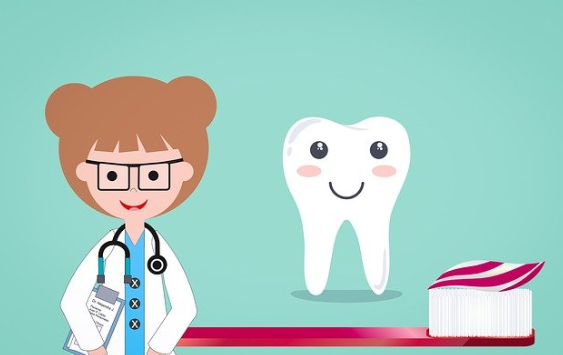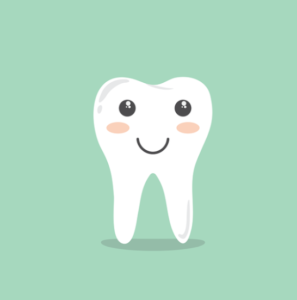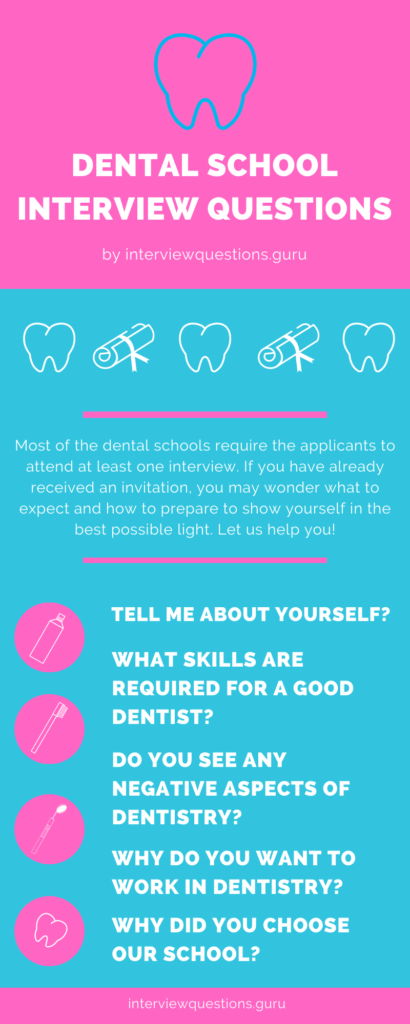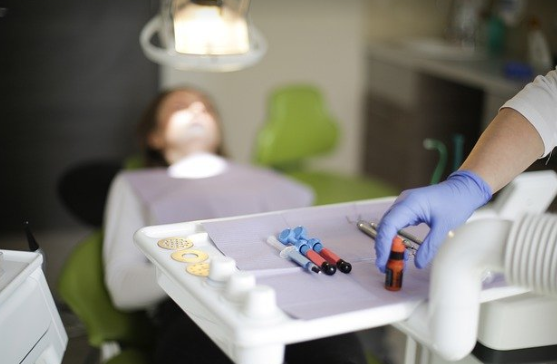
Let’s focus today on the current dental school interview questions 2022. We selected for you 10 most frequently asked questions with tips on how to answer them and increase your chances at an interview.
Getting into a dentistry school is not easy. According to the American Dental Association, only 55% of the candidates are actually admitted to the first year of studies (U.S. News). Most of the dentistry schools require the applicants to attend at least one interview on campus. If you have already received an invitation, you may wonder what to expect and how to prepare to show yourself in the best possible light.
Check our article to see the current 2022 dental school interview questions. We will share with you the best strategies for the answers and many tips that may help you during the interview. Remember, that the purpose of an interview is not only to test your competence level and character but it is also a great opportunity for you, as a candidate, to learn more about the school, to meet the professors, to experience a real atmosphere of a place, probably to have a look on campus, etc.
How to prepare for an interview – tips & checklist

Table of Contents
Dental School Interview Questions
Tell me about yourself?
Probably every candidate, whether it is a job or a school interview expects this question. It is not different in the case of the dentistry school interviews – you should definitely be prepared to introduce yourself in a few sentences. In your response, describe shortly your education and professional path, mention your strong points and skills useful in the profession of a dentist, your passions, and your interests.
If you are still not sure how to answer this question, go to our guide “Tell me about yourself” question in an interview.
Why do you want to work in dentistry?
It is definitely one of the most popular dental school interview questions. The interviewer will try to check here your motivation and your expectations. Dental studies are hard and demanding and will require a lot of determination and sacrifices from your side.
If you want to become a dentist to continue a long family tradition, because you are sure to get a job in a dental practice belonging to your family or because of the high salaries – better don’t mention it during an admission interview. Instead, share how you developed the interest in dentistry and what you would like to do after graduation, and why.
Every dentistry school opens to its graduates’ various career options. After graduation, you can find an associateship, begin s private practice, or continue a postdoctoral education. You can also choose from several dental specialties and subspecialties:
- dental public health
- endodontics
- orthodontics
- oral and maxillofacial pathology
- oral and maxillofacial surgery
- oral and maxillofacial radiology
- pediatric dentistry
- periodontics
- prosthodontics
- restorative dentistry
- forensic dentistry
- dental anesthesiology etc.
Becoming a dentist is your dream or your parents’ dream?
This is another question which aim is to check the applicant’s motivation. The interviewer wants to see if going into a dental school is your own or someone else’s decision. As we already said, dental studies are extremely demanding. Getting a dentistry degree and becoming a good specialist will require from you a lot of self-discipline, determination, and undying motivation. In your response, show that this is your conscious decision and a result of your interests and passions.
Is there any dentist in your family?
This is also one of the dental school interview questions to expect. This question is in fact very similar to the previous one. It checks again if applying for a dental school was your independent decision.
Of course, if you have in your family a dentist, dental assistant, dental hygienist, dental technician, orthodontist, or if any of your closest ones work in dentistry, don’t hide it. You can say that since always, this person is an example and a role model for you and inspired you to follow the same path. Having a dentist in a family gives also a unique opportunity to see how this work looks like from the other, not the patient’s, perspective. You must be already aware of many challenges but you must also already know how rewarding and satisfying it can be.

What skills are required for a good dentist?
As a dentistry school applicant, you don’t need to have any technical skills yet but you will need to have all of them when graduating. Depending on the specialty, it may include: diagnosing oral diseases, interpreting X-rays, administering anesthetics, performing more and less complicated surgical procedures (tooth extractions, placing fillings, etc.), promoting patients’ oral health, monitoring the growth of the teeth and jaws, etc. Apart from that dentists must have good control of their hands and excellent dexterity.
When it comes to the soft skill qualities probably the most important are great communication and interpersonal skills, empathy, compassion, accuracy, and a knack for the organization. They are required to build an efficient work team and to provide the best care for the patients. Did you know that even 24% of people around the world experience a fear of the dentist (source: Harvard Health Blog)? Being able to calm the patient down, to explain in easy words the diagnosis and the treatment, showing empathy and understanding is the key to success.
Do you see any negative aspects of dentistry?
Another example of one of the most common dental school interview questions.
Dentistry provides many rewards but also plenty of challenges. Dentists often need to spend hours on their feet examining the patients. That requires a good physical condition, excellent manual dexterity but also a constant focus and a lot of precision. It can be very tiring and stressful. Another disadvantage is that many dentists need to be available for emergencies 24/7. And finally, the patients themselves can be a challenge. As we already mentioned, many people are afraid of dentists, and it is usually not easy to alleviate their fear.

What would you do if a patient refuses to have an X-ray even though he/she is suffering from pain and without an X-ray a further diagnosis is impossible?
In such a situation, the first thing you need to do is to talk with your patient and understand why he/she doesn’t want to agree on an X-ray. Maybe he/she has some contradictions which you are not aware of (for example a pregnancy) or maybe is scared that it can be harmful to health. In the first case, there is probably nothing more you can do but in the second case, you can try to explain what are the main benefits and risks of X-rays and what are the rules securing their safety (for example the recommended maximum frequency of the exposure).
You can give a patient some time to think. You can also recommend him/her some scientific articles and statistics.
If the patient’s decision is still a “no”, you should respect it. Instead of being judgmental and expressing your disappointment, show your empathy, support, and unconditioned care. Inform the patient that unfortunately without an X-ray, there is nothing you can do now to help him/her. Leave also the instructions about what to do if the pain gets unsupportable (take painkillers, call dental emergency, prepare for extraction, etc.).
How do you plan to finance your education?
All the medical schools are expensive and dental schools are not an exception. Unfortunately, apart from motivation and hard work you will also need to have enough financial resources to cover all the expenses. Ensure the interviewer that you are aware of the costs and that you already have a plan (and a backup plan) for the next months and years. It may include getting financial help from parents, choosing the payment options which are the best for you (payment in advance/in arrears, etc.), government loans, scholarship, part-time job, etc.
Why did you choose our school?
The real meaning of this question is “Why did you choose our school and not some other dentistry school?”, so basically the purpose here is to see what were your selection criteria when deciding which school to apply for. For many candidates, a very important factor is the place of the school in the rankings, education program, campus location, extra-curricular activities, different exchange programs (for example Erasmus+ program), scholarship opportunities, etc.
List of 10 best dentistry schools in the world
- King’s College London (KCL), United Kingdom
- Academic Centre for Dentistry Amsterdam (ACTA), Netherlands
- University of Michigan-Ann Arbor, United States
- University of Hong Kong (HKU), Hong Kong
- Harvard University, United States
- Tokyo Medical and Dental University, Japan
- University of Gothenburg, Sweden
- Karolinska Institute, Sweden
- University of Bern, Switzerland
- University of California, San Francisco (UCSF), United States
List of 10 best dentistry schools in the U.S.
- University of Michigan-Ann Arbor
- Harvard University
- University of California, San Francisco (UCSF)
- University of Washington
- New York University (NYU)
- University of North Carolina, Chapel Hill
- University of Pennsylvania
- University of California, Los Angeles (UCLA)
- Columbia University
- University of Minnesota Twin Cities
What would you do if your candidacy is rejected?
There are several strategies to answer this question. You can say that this school is your first choice but if your application is not accepted, you will probably need to choose another dental school. Such an answer will prove your passion for dentistry and your determination to pursue the education. You can also say, that if you get rejected this year, you will apply again the next year. You will have one year to analyze what went wrong, to work on yourself, and be better prepared for the next year.
This is the end of our list of dental school interview questions 2021.

Questions that you can ask the interviewer
- What does a typical day look like?
- What does a typical weekend look like on campus?
- What exchange programs are available to students?
- What scholarships are available to students?
- What extracurricular activities are available to students?
- What is the atmosphere on campus?
- What kind of events are organized on a campus?
- What advice would you give to incoming freshmen?
- Do you need anything else from me?
- What are the next steps?
Thank you for visiting interviewquestions.guru. Share your suggestions in the comments section below. If you liked this article, don’t forget to leave a thumb up!
Good luck!
Useful links:
Thank you for the help with interview questions. Worth a read.
Thank you for dental school question and answers.